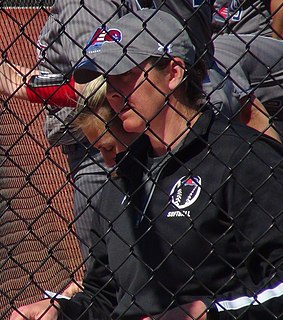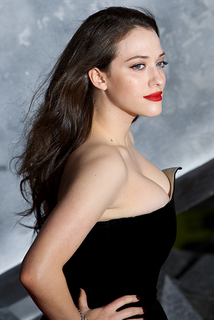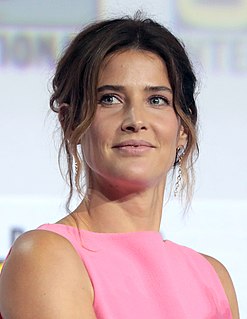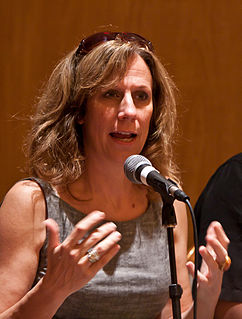A Quote by Jessica Valenti
What bothers me the most about the way that people appropriate feminist language is that they are the same people who are - you know, anti-feminists - they're the same people who say that feminism is ruining the family, yet when it behooves them to, they'll say Sara Palin's a feminist - when all of a sudden it works in their favor.
Related Quotes
Something I say a lot when it comes to anti-feminist stereotypes is that they exist for a reason. The stereotypes of feminists as ugly, or man-haters, or hairy, or whatever it is - that's really strategic. That's a really smart way to keep young women away from feminism, is to kind of put out this idea that all feminists hate men, or all feminists are ugly; and that they really come from a place of fear. If feminism wasn't powerful, if feminism wasn't influential, people wouldn't spend so much time putting it down.
It's always been important to me to be very upfront with people about the fact that I do identify as a feminist because it's an opportunity to expose people to and educated them about the movement. Young women don't identify as feminist is because they don't know any feminists and don't have a comprehensive understanding of what it is, I gave them example and an opportunity to ask about it. And once they saw that I wasn't the embodiment of the negative feminist stereotype - that I was a normal teen girl just like them - I think they became more open to learning about what feminism really is.
As all advocates of feminist politics know most people do not understand sexism or if they do they think it is not a problem. Masses of people think that feminism is always and only about women seeking to be equal to men. And a huge majority of these folks think feminism is anti-male. Their misunderstanding of feminist politics reflects the reality that most folks learn about feminism from patriarchal mass media.
I have been villainized because of my identity - I've received nasty blog comments and emails just based on my willingness to identify with feminism by people who clearly don't understand what I value and why I identify as a feminist. Ultimately, I'm less concerned with whether or not people identify as feminist and am more concerned with whether or not people understand what feminism is. If they don't want to identify as a feminist that's fine. I respect people's decision to identify any way they want and expect that same respect in return, although I don't always get it.
Naturally my stories are about women - I'm a woman. I don't know what the term is for men who write mostly about men. I'm not always sure what is meant by "feminist." In the beginning I used to say, well, of course I'm a feminist. But if it means that I follow a kind of feminist theory, or know anything about it, then I'm not. I think I'm a feminist as far as thinking that the experience of women is important. That is really the basis of feminism.
The way I view feminism — and I know there are a lot of different things going on — but, at its purest form, to me, it's a very positive, supportive, nurturing, empowerment thing. I mean, God, who isn't a feminist? If you don't think women are as good as men, you're not a good person. I like to think that most of the population of people worth being friends with are feminists, if that's what feminism means.
I consider myself 100 percent a feminist, at odds with the feminist establishment in America. For me the great mission of feminism is to seek the full political and legal equality of women with men. However, I disagree with many of my fellow feminists as an equal opportunity feminist, who believes that feminism should only be interested in equal rights before the law. I utterly oppose special protection for women where I think that a lot of the feminist establishment has drifted in the last 20 years.
I know a few women younger than me who have careers and children, and so the burgeoning career and family happen at the same time. A few have said something like, "During dating, he was all about feminism. But now I have to ask him to help with the children, I have to ask him to do the dishes, and every time he does, it's like a favor. Where's the feminist I married?" That's theoretical feminism, not practical feminism. I don't think we're all where we need to be. I don't know if we will be in my lifetime. Life is imperfect. But interesting.
I think I'm speaking for a bunch of girls when I say that the idea that feminism is completely natural and shouldn't even be something that people find mildly surprising. ...I find a lot of feminist reading quite confusing and that often there's a set of rules, and people will be like, 'Oh, this person isn't a true feminist because they don't embody this one thing,' and I don't know, often there is a lot of gray area that can be hard to navigate.
It is easier to talk about issues; it is easier to say you're a feminist because it's actually awesome to be one. The panopoly of people identifying as feminists is really excellent now that we've come to a point where all these really interesting voices are rising up and saying they're feminists - women of color, trans people, gay folks, everybody. It's an exciting time to actually define as that because it means that people are really feeling like their voice is what's the most important thing in the movement, and I love that.


































